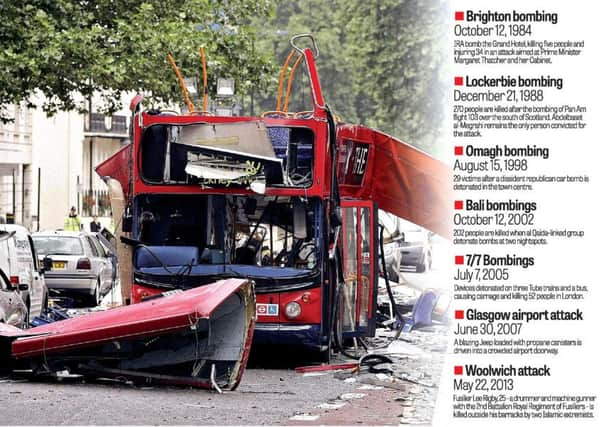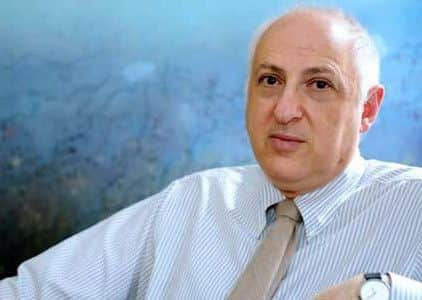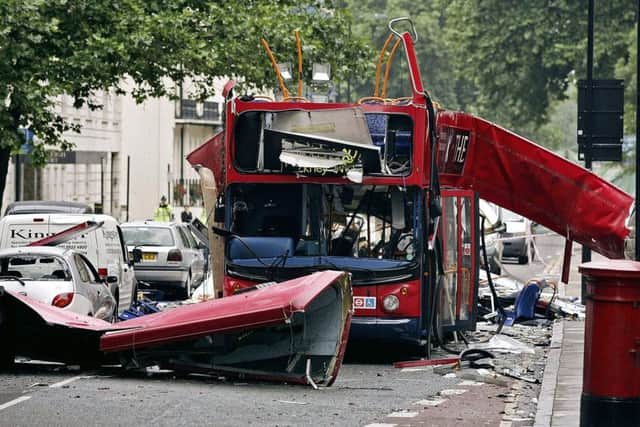7/7 anniversary: UK’s risk of terror attack ‘higher now than days of London bombings’


The emergence of Islamic State has added a “completely separate set of dynamics” to the threat picture, the Liberal Democrat peer said.
However Lord Carlile, who held the role of independent reviewer of terrorism legislation at the time of the 7/7 attacks, said Britain remains “as safe a country as you will find”.
Advertisement
Hide AdAdvertisement
Hide AdSeparately, a senior Manchester police officer who leads the the Prevent programme to identify and stop potential extremists says the scheme is working, despite recent events.


In an interview to mark the 10th anniversary of the atrocity, Lord Carlile told the Press Association there are now “more people who would do us harm”.
He identified the rise of so-called ‘Islamic State’ - also known as Isis and Isil - and the group’s propaganda machine as a key development.
“Al Qaida were and are very nasty, in many ways, but Isil are of a different order.
Advertisement
Hide AdAdvertisement
Hide Ad“I believe that Isil are much more subtle than al Qaida and that there is a realistic possibility that there are Isil sleepers here trained and willing to carry out terrorist acts from time to time but not necessarily immediately. That is a serious worry. “


He said Isil represents a “much greater threat to the world” than al Qaida. “They have a great deal of money, they are able to operate like a nation state and they profess the destruction of western values.”
Lord Carlile said he fears the West’s “rather tentative” approach to IS is not succeeding.
However, he added: “I think this is as safe a country as you will find anywhere in the world.
Advertisement
Hide AdAdvertisement
Hide Ad“Obviously the Lee Rigby murder was terrible but the fact that we’ve had so little in the way of actual major terrorist acts since 2005 is remarkable, particularly when you think that in that period we’ve had the Olympic Games.
“We know that terrorism events have been disrupted that is a very large feather in the cap of the British authorities.”
However, the scale of the threat currently facing the West can be reduced, he suggested.
“When I started in 2001, when I became independent reviewer, I thought we were looking at a generation, which I’ll call 20 years. I now think we were probably looking at a generation and a half.
Advertisement
Hide AdAdvertisement
Hide Ad“That is not to say there will not be other terrorist threats because there always have been.
“But on this scale, I think and I hope, that certainly in my lifetime, we will see this type of terrorist threat diminish. But getting there may be difficult. There may have to be some major conflagration to bring this sort of terrorism threat to an end.”
In a separate interview, Sir Peter Fahy, chief constable of Greater Manchester Police and national policing lead on Prevent, the Government’s strategy to stop people being drawn into terrorism, said the nature of such schemes meant tangible results were hard to show.
But he said the plans were proving effective in managing community tensions while also identifying potentially problematic individuals.
Advertisement
Hide AdAdvertisement
Hide AdThis week a new duty on all public sector staff to look out for signs of extremism came into effect and Sir Peter said broadening Prevent outside of the police had helped.
He acknowledged the scheme faced problems when it was first started and was “too police dominated”.
Sir Peter told the BBC Radio 4 Today programme: “When Prevent started, it was very much when there was a lot of ill feeling about British foreign policy - but that’s changed.”
July 7 2005 dawned with London still basking in the euphoria of being selected to stage the 2012 Olympics a day earlier.
Advertisement
Hide AdAdvertisement
Hide AdBut within hours, the jubilant mood was a distant memory as the capital and the country were consumed by horror and grief at the worst single terrorist atrocity on British soil.
The perpetrators might have been commuters like millions of others setting off for work when they arrived at Luton station at 7.15am that morning.
But Mohammed Sidique Khan, 30, Shehzad Tanweer, 22, Hasib Hussain, 18, from Leeds, and Jermaine Lindsay, 19, from Huddersfield, boarded a train intent on executing a plan to bring chaos and carnage to London.
Tanweer, Khan and Lindsay detonated bombs on tube trains within around a minute at 8.50am. Seconds after leaving Liverpool Street, an eastbound Circle Line train was blown up by Tanweer, killing seven people.
Advertisement
Hide AdAdvertisement
Hide AdAt Edgware Road, a bomb was detonated by Khan on a westbound Circle Line train, killing six people. Then Lindsay blew himself up in the packed front carriage of a Piccadilly Line train between King’s Cross and Russell Square, killing 26 people.
In the minutes that followed London Underground’s control centres scrambled to understand what had taken place. In the early confusion, the incident was initially reported as a power surge.
While his co-conspirators were carrying out their part in the strike, Hussain was captured on CCTV emerging from King’s Cross and joining the melee of commuters evacuated after the initial blasts.
After attempting to contact his fellow bombers, he bought a replacement battery for his device’s detonation circuit before boarding a number 91 bus. The bus terminated early, however, so he got on a number 30 double decker. When it reached Tavistock Square, Hussain blew himself up, killing 13 people and injuring dozens.
Advertisement
Hide AdAdvertisement
Hide AdThe July 7 attacks shaped the landscape for the fight against terrorism in the UK for years to come.
They represented the first major atrocity on British soil by Islamist extremists and brought into stark relief a threat which was so horrifyingly demonstrated in New York four years earlier.
That the perpetrators were all “home-grown”, apparently normal members of society, made their murderous acts all the more shocking.
When another attempt to bomb the capital’s transport network failed a fortnight after 7/7, the sense of alert heightened further.
Advertisement
Hide AdAdvertisement
Hide AdThen-prime minister Tony Blair warned that the “rules of the game are changing” as he announced wide-ranging powers to combat Muslim extremists.
The following year, the government made public for the first time authorities’ assessment of the possibility of a terror attack in UK at any given time.
In an indication of the enduring nature of the threat, it has mainly stood at either of the top two levels - critical or severe - since it was first published in August 2006.
Although no mass casualty attacks on the scale of 7/7 have happened since, there is no doubt that the UK has been targeted for terrorist operations on a number of occasions over the last decade.
Advertisement
Hide AdAdvertisement
Hide AdIn November Home Secretary Theresa May revealed that 40 plots have since been foiled.
Some of these have been well-documented, such as a plan to blow up transatlantic jets and to bomb the London Stock Exchange, while others are known only to the security services.
If al Qaida were seen as posing the greatest threat in the aftermath of 7/7, the emergence of so-called ‘Islamic State’ (IS) in the Middle East has added a new dimension to the challenge facing the police and security services.
IS has sought to export its own brand of terror beyond Syria and Iraq and claimed responsibility for last week’s Tunisa attack.
Advertisement
Hide AdAdvertisement
Hide AdIn a recent speech, Mrs May said: “The atrocities on 7/7, carried out by British terrorists, intent on the mass murder of fellow British citizens, changed the way we understood and approached the threat from terrorism. Ten years later we have seen that the threat has evolved, and it has become more serious and more complex.”
READ MORE...